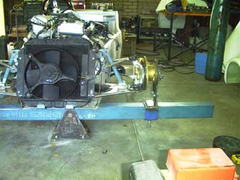Jermyn
|
| posted on 16/2/05 at 05:41 PM |

|
|
Tire track affecting chassis stiffness
OK, heres a question that I'm struggling to understand in reading the chassis books.
Lots of builders are using wider, larger tyres on the rear of their cars. I would like to do the same but I am concerned about how it will affect the
chassis stiffness.
First off, is the tracking measured by the center of the tyres front and rear or from the inside edge?
Secondly, what has the greatest affect on the stiffness, the mounting points on the chassis for the bones or the tyre tracking? I always thought it
was the mounting points for the bones, and keeping them parallel would make a stronger chassis.
However, If I planned to use wider tyres in the rear then perhaps I would have to sacrifice one or the other unless the answer is adjusting the offset
on the rear wheels to accomodate for inline mounts on the chassis and inline tyre mounts?
Did I solve the problem Still, I need an answer on the first question. Still, I need an answer on the first question.
Also, on IRS, should I try to keep the length of the bones as close as possible to maintain optimum stiffness?
If life is a race do you want to be the first one to finish?
|
|
|
|
|
britishtrident
|
| posted on 16/2/05 at 07:21 PM |

|
|
You are obviously confusing roll stiffness and chassis torsional stiffness.
Get a copy of "How to Make Your Car Handle" By Fred Phun read it through a couple of dozen times. Pay particular attention to the what is
in the book about roll centres, roll axis inclination, roll couple distribution, tyre friction and chassis stiffness.
But to answer your question another way a car with more than 50% of its unladen weight on the rear wheels will generally require wider tyres or tyres
& wheels on the rear to avoid excessive oversteer, this generally results in the rear width across the outer edges of the rear wheel/tyre being
slightly greater than the front but this is a relatively minor effect.
Usually the difference in tyre section width should be no more than 10 or 20 mm -- for example 175/50x14" on front matching 195/50x14"
on rear.
[
[Edited on 16/2/05 by britishtrident]
|
|
|
cymtriks
|
| posted on 16/2/05 at 08:26 PM |

|
|
As has been said suspension stiffness isn't the same thing as chassis torsional stiffness.
Regarding the track, in general wider is better. Think of something tall and thin like a double decker bus and something low and wide like a supercar.
The low and wide car generally handles better. A big BUT comes in at this point. Though handling and cornering get better as a car gets wider and
lower manouvreabilty declines. Go too wide and the car becomes slower for this reason. Track is measured between the centres of the tyre contact
patches. The overall width of a Seven is usually between 62 to 66 inches.
Regarding tyre width you won't actually need bigger tyres at the rear on a Seven type car in most cases. Most front engined rear drive cars have
the same sized tyres all round. If you want a hot rod look then this is probably the only way to get it though.
For wishbone length a good guide is to make the upper wishbone two thirds of the length of the lower one.
|
|
|
clbarclay
|
| posted on 16/2/05 at 09:06 PM |

|
|
Remember that wider tyres, whalst improving grip/traction, also increase rolling resistance and can ruin ride quality.
They also increas risk of aquaplaning.
Theres good reason for racing locosts using 185/60r13. unless you're using very powerfull engines then looks is the only practical benifit wider
tyres give.
|
|
|
Jermyn
|
| posted on 16/2/05 at 09:24 PM |

|
|
I'm on the hunt for the Puhn book now
My main concern is chassis torsional stiffness at this point in time.
I would think the suspension mounting points would have an affect on both chassis torsional and suspension stiffness. Correct me if I am wrong.... In
this case, isn't it best to keep the mounts parallel front and rear?
If life is a race do you want to be the first one to finish?
|
|
|
cymtriks
|
| posted on 16/2/05 at 10:41 PM |

|
|
No. The stiffness is measured as the torque required to twist the chassis by a given amount. The torque is applied at the front and rear spring
mounts.
In my models I hold the rear spring mounts in the vertical direction and apply equal but opposite vertical loads at the front spring mounts. This
applies a torque to the chassis. The deflections at the front spring mounts can then be used to calculate the angle that the chassis has twisted.
Real chassis are tested in a similar manner. The loads being applied by long levers attached to the front mounts and with a pivot half way between the
mounts. Dial gauges then measure the defections.
|
|
|
niceperson709
|
| posted on 16/2/05 at 11:26 PM |

|
|
Over here in Aussie we all haveto have a trosion test for our chassis here is a pic of the set up should give you the idea.
best wishes
Iain
[Edited on 16/2/05 by niceperson709]
 
Rescued attachment Official Test Setup.jpg
Best wishes IAIN
life is not the rehearsal , it's the show so don't sit there thinking about it DO IT NOW
http://iainseven.wordpress.com/

|
|
|
niceperson709
|
| posted on 16/2/05 at 11:29 PM |

|
|
try this
 
Rescued attachment jig2.jpg
Best wishes IAIN
life is not the rehearsal , it's the show so don't sit there thinking about it DO IT NOW
http://iainseven.wordpress.com/

|
|
|
Jermyn
|
| posted on 17/2/05 at 02:58 PM |

|
|
OK OK
I went back and read the Adams book last night and I was confusing the two. Sorry 
If life is a race do you want to be the first one to finish?
|
|
|









